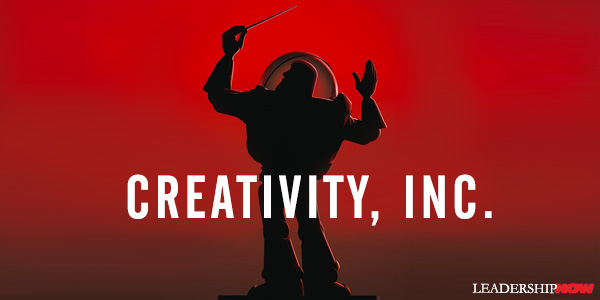 |
 |
05.23.14

Creativity, Inc.
Ed Catmull’s Book, Creativity, Inc. is about how to lead when you care about and believe in the people you lead. Catmull is co-founder of Pixar Animation Studios and president of Pixar Animation and Disney Animation. Rethink, adapt, and push-on describes his career path. Inspire by the TV show, The Wonderful World of Disney, Catmull wanted to be an animator. But he knew he would never be good enough to do it professionally. So, naturally, he went into physics and the emerging field of computer science. Eventually, that lead him to computer graphics. By 26 he had set a life goal: To make the first computer-animated feature film. By pursuing what he was good at it allowed him to do what he was passionate about. A good section for any young person to read who is wondering "What next?"From the early days at Lucasfilm to Pixar, success caused Catmull to ask why companies expanded like bubbles and then burst. “What was causing smart people to make decisions that sent their companies off the rails? Can paying careful attention to the missteps of others help us to be more alert to our own? Or is there something about becoming a leader that makes you blind to the things that threaten the well-being of your enterprise?” Creativity, Inc. provides insight into the answers to these questions from his experience at Pixar. It’s “about the ongoing work of paying attention—of leading by being self-aware, as managers and as companies.” After the success of Toy Story, he discovered an important dynamic: The good stuff was hiding the bad stuff. “When downsides coexist with upsides, as they often do, people are reluctant to explore what’s bugging them, for fear of being labeled complainers. I also realized that this kind of thing, if left unaddressed, could fester and destroy Pixar. Being on the lookout for problems was not the same as seeing problems.” Another key lesson : “Getting the team right is the necessary precursor to getting the ideas right. That means it is better to focus on how a team is performing, not on the talents of the individuals within it. Find, develop, and support good people, and they will in turn find, develop, and own good ideas.” Catmull admits, “early on all of our movies suck.” He walks us through the process they use to develop ideas into a successful finished product. Candor is key. At Pixar, candor trumps hierarchy. “People who take on complicated creative projects become lost at some point in the process. The details converge to obscure the whole, and that makes it difficult to move forward substantially in any one direction. The experience can be overwhelming. No matter what, the process of coming to clarity takes patience and candor.” At Pixar they have built candor into the system by the use of various feedback mechanisms. For example they have the Braintrust. It is made up of people with a deep understanding of storytelling and, usually, people who have been through the process themselves. It has no authority and it doesn’t try to fix the problem but to try to identify the root cause of the problem. The inevitability of mistakes is a given. They are the consequence of doing something new. “Failure is a manifestation of learning and exploration.” Importantly, “if your primary goal is to have a fully worked out, set-in-stone plan, you are only upping your chances of being unoriginal.” Start things that might fail. “Management’s job is not to prevent risk but to build the ability to recover.” Along with that is the leader’s responsibility to protect the new. “Part of our job is to protect the new from people who don’t understand that in order for greatness to emerge, there must be phases of not-so-greatness.” A new idea “may be ungainly and poorly defined, but it is also the opposite of established and entrenched—and that is precisely what is exciting about it.” Incidentally, it is the insecurity of leaders that causes them to take issue with the uncertainty of the new. Instead of growing they mobilize all of their strength in defense of the status quo. Sometimes there is no other way to grow than “by putting yourself in the unstable place and then feeling your way.” A leader that won’t listen or consider new ideas isn’t leading, they’re entrenching. A case for developing leaders at all levels is found in this statement: “If we allow more people to solve problems without permission, and if we tolerate (and don’t vilify) their mistakes, then we enable a much larger set of problems to be addressed.” As leaders, much of what we need to know we can’t see. A leader’s view is obstructed by “people who are skilled at figuring out what the leader wants.” We want to believe what they say. We also like to think that we are right and know more than we really do. “There is nothing quite as effective, when it comes to shutting down alternative viewpoints, as being convinced you are right.” Catmull reminds us that things constantly change as they should and “with change comes the need for adaptation, for fresh thinking, and, sometimes, for even a total reboot—of your project, your department, your division, or your company as a whole.” There will always be mistakes and problems. “We must work to uncover them and assess our own role in them” and then do whatever it takes to solve them.

Posted by Michael McKinney at 08:53 AM
|
BUILD YOUR KNOWLEDGE
 

How to Do Your Start-Up Right STRAIGHT TALK FOR START-UPS 
Grow Your Leadership Skills NEW AND UPCOMING LEADERSHIP BOOKS 
Leadership Minute BITE-SIZE CONCEPTS YOU CAN CHEW ON 
Classic Leadership Books BOOKS TO READ BEFORE YOU LEAD |